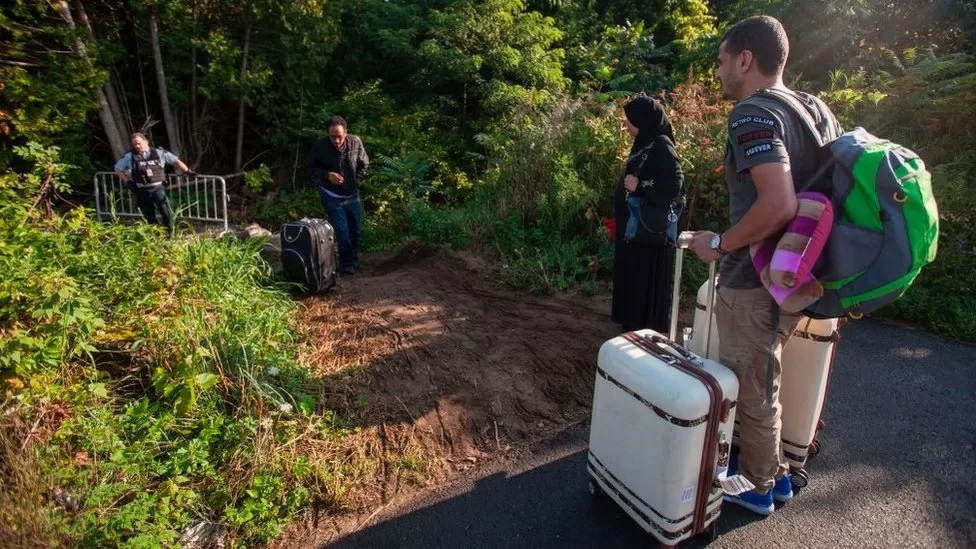Canada’s Supreme Court has upheld an asylum pact between Canada and the United States.
The pact – the 2004 Safe Third Country Agreement (STCA) – designates the US as a “safe” country for migrants.
It requires refugee claimants to request asylum in the first of the two countries they reach.
Campaigners have long argued that the STCA should be struck down, saying migrants are at a risk of harm in the US.
In a unanimous decision released on Friday, the highest court ruled that the STCA does not violate part of Canada’s Charter of Rights and Freedoms, which outlines the right “to life, liberty and security of the person”.
Refugee advocates had argued that Canada’s designation of the US as a “safe” country violates its charter, saying that migrants are at risk of detention and mistreatment when Canada turns them back to the US.
But the Supreme Court disagreed.
“In my view, the record does not support the conclusion that the American detention regime is fundamentally unfair,” wrote Justice Nicholas Kasirer on behalf of the court.
Justice Kasirer added that the agreement does not violate refugees’ rights as it has “safety valves” in place, such as offering asylum seekers the option to defer their removal or get a temporary residence permit as their case is being heard.
The court, however, did not rule whether the agreement violates Section 15 of Canada’s charter, which guarantees equality for all under law, saying it is a “serious” matter that requires further consideration.
Refugee advocates had argued that the US often denies asylum claims from those fleeing gender-based violence.
The Supreme Court said it will return this argument back to the Federal Court to examine.
This leaves open the possibility that the asylum pact between the two countries could be struck down in the future, said Adam Sadinsky, a lawyer with the Canadian Association of Refugee Lawyers who intervened in the case.
“There is still an open question as to whether the agreement is constitutional,” Mr Sadinsky told the BBC.
The STCA was put in place to better manage refugee claims at the US-Canada land border and to avoid asylum seekers making claims in multiple countries, or so-called “asylum shopping”.
The US is the only nation designated as a “safe third country” by Canada – a designation based, in part, by Ottawa’s belief that the US meets a high standard in protecting human rights.
It was challenged by the Canadian Council of Refugees, Amnesty International Canada, The Canadian Council of Churches and eight other plaintiffs on behalf of three women who attempted to seek asylum in Canada from the US.
One of the women said she was held in solitary confinement in a cold detention centre when she was sent back to the US.
In 2020, Canada’s Federal Court of Appeals ruled the asylum agreement the country has with the US is invalid because America violates the human rights of refugees.
The Canadian government challenged that decision, landing the case before the Supreme Court, where it was heard last October.
Gauri Sreenivasan of the Canadian Council of Refugees said she was “disappointed” that the pact was upheld by the top court.
“We continue to call for the government to fully and immediately withdraw from the STCA,” Ms Sreenivasan said at a news conference on Friday, adding that the agreement “tarnishes Canada’s identity as a compassionate and welcoming nation”.
Canada’s minister of immigration, Sean Fraser, said the country remains committed to being a leader when it comes to the resettlement of refugees, but said it is important that it promotes “orderly pathways” to migration.
He added that while the US and Canada systems slightly differ, the US has a functioning asylum system that allows migrants to request protection within its borders.
For much of the pact’s history, the agreement only applied to official border crossings between Canada and the US, prompting thousands to enter on foot through so-called “irregular border crossings” – the most popular being Roxham Road between the state of New York and the province of Quebec.
In March, an amendment to the STCA was announced. It now applies to the entirety of the US-Canada border, closing off alternative routes like Roxham Road to those seeking asylum in Canada through the US.
Source : BBC






























